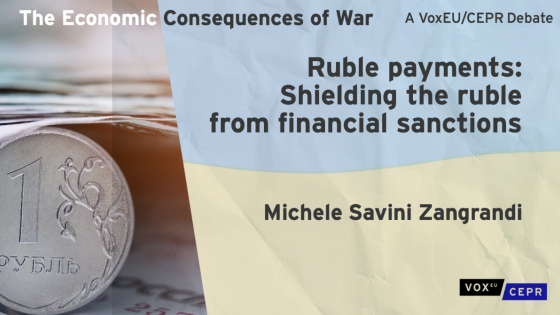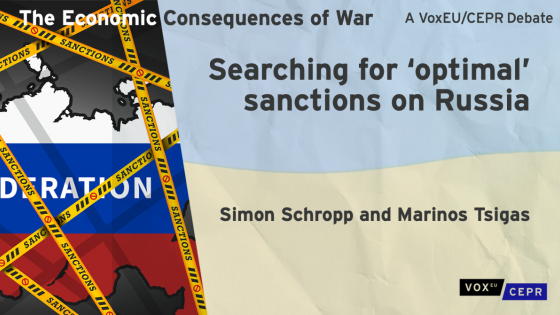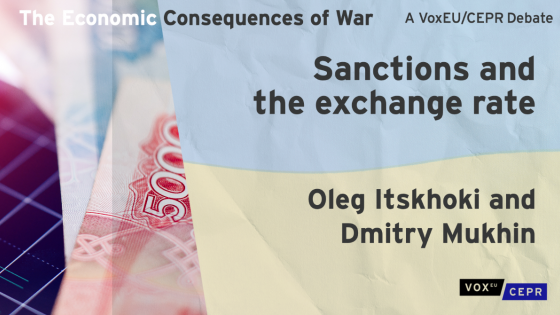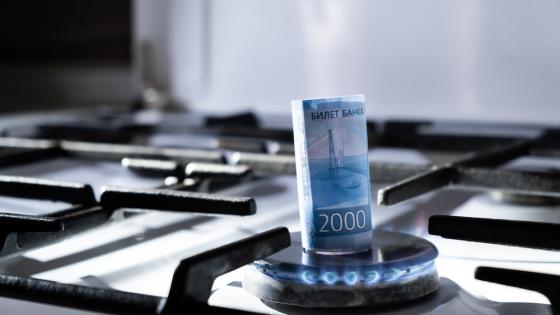Editors' note: This column is part of the Vox debate on the economic consequences of war.
In March 2022, the Kremlin set out a complex mechanism for ruble settlement of gas exports to “unfriendly countries”. The request sparked a lively debate on the Kremlin’s objective. In fact, the purpose of the measure – and the consequences of going by it – remain unclear.
Close inspection of the Kremlin’s decree yields an important clue as to what might be going on. In March, the Kremlin did not just mandate payments to be settled in rubles, but also for rubles to be obtained on the Moscow Interbank Currency Exchange MICEX-RTS (MICEX). This detail is striking: there is no immediately obvious reason for the Kremlin to be interested in where the currency exchange takes place.
In this column, I argue that the ruble payment scheme is intended to protect MICEX – a cornerstone of ruble trading and a central piece of Russia’s financial architecture – from financial sanctions. MICEX’s reliance on correspondent accounts with Western banks makes it vulnerable to US sanctions. Should it come under sanctions, ruble price fixing and ruble trading could be thrown into disarray. While alternative pricing mechanisms and trading venues would emerge, the short-term damage to Russia’s economy could be material.1 In making MICEX indispensable to the settlement of gas transactions, the Kremlin might therefore be signalling that sanctions aimed in that direction would come at a high price.
Settle in rubles
On 31 March 2022, a Russian presidential decree required that gas importers from “unfriendly countries” to follow a new procedure to settle gas payments.2 The procedure entails the following steps:
- Open two ‘Special K’ accounts with Gazprombank – one in foreign exchange, and one in rubles
- Pay the contractual sums on the special foreign exchange account
- Instruct Gazprombank to convert the sums on MICEX into rubles and pay them in the special ruble account
- Instruct Gazprombank to use the resulting ruble balance to pay for its gas imports
Crucially, gas transactions are only considered settled upon receipt of the ruble balances obtained through the outlined procedure.3 To stress this further, a subsequent decree mandates Gazprombank to deposit the foreign exchange to be converted on the correspondent accounts of the National Clearing Center, a non-financial institution fully owned by the Moscow Exchange, which also hosts MICEX.4
Unclear objective
While a number of hypotheses have been put forward, no consensus exists as to what the Kremlin aims to achieve through this measure.
A first set of hypotheses sees the measure as supporting the ruble (Mihailov 2022). The regime of forced export revenue conversion and capital controls, however, proved more than sufficient to stem pressures on the ruble (Itskhoki and Mukhin 2022).
A second set of hypotheses sees the measure as a way to weaponise gas supplies. One hypothesis postulates that by charging exorbitant exchange commissions, Gazprombank could de facto increase the price of gas. An alternative sees the measure as preparing for a halt in supplies should payment of gas supplies be locked into an escrow account. The measure also appears to make it easier for Gazprom to declare force majeure, thus skirting penalties for breach of contract (Ason 2022). Gas prices however are already at record highs, exchange rate risk appears to remain with the exporter,5 and Russia has already halted gas supplies without much consideration for contractual binds.6
A third set of hypotheses sees the measure as a ploy to circumvent financial sanctions. One hypothesis concerns the circumvention of central bank sanctions (Astrasheuskaya et al. 2022, Demertzis and Papadia 2022). Another hypothesis sees the channelling of payments through Gazprombank as a means to cut out EU banks and take foreign exchange funds outside of Western jurisdictions (Merler 2022). In the first case, however, it is unclear why Russia’s central bank would participate – even indirectly – in foreign exchange transactions, at the risk of adding to the stock of its frozen reserves. In the second case, the hypothesis discounts the fact that – even when held by non-residents – assets tend not to leave their native jurisdiction. For instance, it would be reasonable to expect euro payments to Gazprombank to be credited to its euro-correspondent – Bank GPB International SA, a fully owned subsidiary chartered in Luxembourg.7
A fourth set of hypotheses sees the measure as heralding the internationalisation of the ruble. Taken together with the Russian central bank’s decision to resume gold purchases in late February, some hypotheses see the ruble settlement request as drawing a connection between the ruble and gold (Merler 2022). Ruble internationalisation, however, appears incompatible with Russia’s current account surplus and its (temporarily) closed capital account. Rule of law and geopolitical considerations would also contribute to the headwind. Linkage of the currency to gold, in addition, would require two-way convertibility, that is, a standing commitment to redeem ruble in gold.
Finally, the measure is also seen as a ploy to sow political division among EU member states (Concha 2022, Osmolovska 2022), or as grandstanding on the part of President Putin.
Hiding in plain sight
Most of these surveyed hypotheses overlook the role that MICEX plays in the new settlement architecture. MICEX is the main ruble trading venue. The ruble can, however, also be obtained bilaterally, including through a limited number of foreign banks. While the offshore market is now much diminished, alternatives to MICEX exist and there appears to be no obvious reason for the Kremlin to be so specific about the trading venue.
What is unique about MICEX, however, is that it is the sole organised exchange for ruble trading, and by far the most liquid ruble market. Arguably, no other market is deep enough to provide a solid anchor for ruble price-formation.
In clearing the foreign exchange leg of transactions, MICEX relies on euro and dollar correspondent accounts with foreign banks. Specifically, the National Clearing Centre – which provides clearing services for the exchange – holds its euro and dollar correspondent accounts with US bank J P Morgan.8 Should the US freeze these accounts, MICEX would no longer be able to clear transactions in euros or dollars, throwing the main ruble trading venue into disarray. While alternative pricing mechanisms and trading venues would emerge, the short-term damage to Russia’s economy could be material.
Sheltering the ruble
To see how ruble-settlement could be a measure to shelter MICEX from US sanctions, it helps to focus on two key tenets of the Kremlin’s decree: (i) the currency exchange must take place on MICEX, and (ii) the transaction is considered settled once the ruble payment is received by the gas exporter. With this in mind, it is clear that, should MICEX come under sanctions, it would no longer be able to clear the foreign exchange leg of transactions. As a consequence, Gazprombank would be unable to convert foreign exchange into rubles and payments for gas supply transactions could not be considered settled. If the transactions are not settled, gas supplies are shut off.
The measure effectively binds MICEX into the gas settlement procedure, which previously only entailed Gazprombank. Whereas Gazprombank had to stay outside of the sanction perimeter in order to allow for the payment of EU gas supplies, the same must now apply to MICEX. In tying gas exports to the EU to the functioning of MICEX, the Kremlin might have constructed a clever incentive scheme by which it encourages the EU to lobby the US against sanctions that the US could otherwise impose on a unilateral basis.
This hypothesis could mark a new step in the dynamic of ‘weaponisation of interdependencies’. Indeed, economic sanctions evolved from straight bilateral trade restrictions, to extraterritorial financial sanctions, to value-chain propagated target trade restrictions. As sanctions broaden their extraterritorial reach, so might sanction defences.
Author’s note: The views expressed are personal and do not necessarily reflect the views of the Bank of Italy or the European Central Bank. I am grateful to Claudia Biancotti, Emidio Cocozza, Flavia Corneli, Riccardo Cristadoro, Fabrizio Ferriani, Gabriele Fraboni and Giovanni Veronese for their thoughts and comments.
References
Ason, A (2022), “Rouble gas payment mechanism: implications for gas supply contracts”, Oxford Institute for Energy Studies.
Astrasheuskaya, N, H Dempsey, K Martin and C Giles (2022), “Why does Putin want Europeans to pay for gas supplies in roubles?”, Financial Times.
Concha, J (2022), “What's Driving Moscow's New Gas Payment System”, Energy Intelligence Group.
Demertzis, M and F Papadia (2022), “A sanctions counter measure: gas payments to Russia in rubles”, Brugel Blog.
Harrison, M (2022), “Western sanctions on Russia are working, an energy embargo now is a costly distraction”, VoxEU.org, 13 June.
Itskhoki, O and D Mukhin (2022), “Sanctions and the exchange rate”, VoxEU.org, 16 May.
Merler, S (2022), “Rouble Trouble: why the new Russian gas payment scheme matters”, Algebris Investments, Market Views.
Mihailov, A (2022), “Why paying in roubles for Russian gas and oil might matter”, VoxEU.org, 29 March.
Osmolovska, A (2022), “The ruble gas gamble”, Atlantic Council.
Schropp, S and M Tsigas (2022), “Searching for ‘optimal’ sanctions on Russia”, VoxEU.org, 17 June.
Endnotes
1 For additional analysis on sanctions on Russia, see also Harrison (2022) and Schropp and Tsigas (2022).
2 Presidential decree No. 172.
3 Presidential decree No. 172, Articles 6 and 7.
4Presidential decree No. 254, Article 7.
5 This interpretation also appears confirmed by Italian gas importer ENI: https://www.eni.com/it-IT/media/comunicati-stampa/2022/05/eni-apertura-conti-gazprom-bank-avviata.html
6 To date, gas supplies have been halted to Poland, Bulgaria and Finland.
7 https://www.gazprombank.ru/en/finance/correspondent_network/
8 https://www.nationalclearingcentre.com/catalog/5105.html



